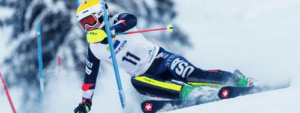Canadians Read, Philp knockin’ on podium’s door

[ad_1]
Gordie Bowles
When Erik Read and Trevor Philp posted the first and second fastest times in the second run of the last World Cup giant slalom in Alta Badia, Italy, just before Christmas, it reaffirmed their own belief that they have the speed to compete with the best.
According to Nick Cooper, head coach of the men’s tech team, the top two Canadian technical skiers have the speed, the form and the mental game to challenge for a podium but now seek to complete the puzzle.
“That second run [in Alta Badia] was good for the team but for both of them it was like ‘ya, well that was only one run, I want to do it in two,’” Cooper explained. “They recognize that they can compete with the best in the world and ski to podiums but we just have to put it all together.”
Cooper said that part of the strategy is to post a more competitive first run, close to the top five, and then ski a smart second run for a podium challenge.
“We had a taste of that [podium threat] in Val d’Isere when they both fell in the second run [Philp had the second fastest split before he crashed near the finish, Read was fifth before falling]. But we took positives from that day knowing that the speed is building and we’re getting into a good spot.”
Read, 30, a GS and slalom skier is on a slightly different program than Philp, 29, who competes in GS, super G and combined. But both have their sights set on World Cup success, and of course on the upcoming Beijing Olympics in early February.
For Philp, the Olympic program became more complicated with the alpine combined using downhill as the speed discipline, as opposed to super G. Philp will be spending the early part of January chasing downhill points to lower his ranking to officially qualify for the Olympic combined. Philp was the top Canadian at the world championships in last season’s alpine combined in Cortina which included super G as the speed event. The plan is for Philp to race Europa Cup downhills in Tarvisio, Italy, after the World Cup GS in Adelboden, Switzerland on Jan. 8th.
And for Read, the focus will continue to be on GS although his success in the first two World Cup slalom races at Val D’Isere (17th) and Madonna (13th) have expanded the expectations.
He will race in the slalom at Zagreb, Croatia, on Wednesday.

“We feel collectively that when the big success happens it’s going to happen in GS first,” said Cooper. “But in Madonna he had some top-three splits, both runs on the top half of the course he was incredibly fast but gave away a bit on the bottom, so it’s close.”
According to Cooper, the training focus has been on GS but some of the slalom performances for Read have been a “pleasant surprise.”
Olympic aspirations … and distractions
For World Cup focussed coaches and skiers the Olympics can be a challenge, some say a distraction. The high volume of variabilities and unknowns are hard to navigate in preparing for the global event, particularly at the Chinese National Skiing Centre where very little is known.
But, as history has proven, Olympic success can create a windfall of opportunity and notoriety for the sport, team and individuals.
For Cooper, the focus remains on the process, not on the outcome.
“I’m still of the attitude that it’s so hard in ski racing to peak for the Olympics,” Cooper said. “There are so many variables, the snow, weather, your bib … it’s not like speed skating where you are thinking, ‘I just need to be in the best shape of my life for this week’,” he said.
“The Olympics are interesting, anything can happen and, as Alta Badia showed, they have pace right now,” Cooper said. “It’s definitely something they’re both building towards but not making it the sole focus. … We want to take each race as it comes but they’ve done a good job steadily lowering their bibs.”
The next part of the Olympic challenge: preparing for a slope about which very little is known; therefore, nobody seems to have an advantage or even basic knowledge of the terrain and snow conditions.
“There are videos on YouTube, but it’s really hard to tell,” Cooper said. “Even when you watch ski racing on TV versus being at the venue is really different, so yeah, it’s pretty unknown.”
With a cold climate and expected dry and aggressive snow, Cooper thinks the race hill and conditions could be comparable to Colorado snow.
“Both of those guys [Read, Philp] spent a lot of time in Colorado with NCAA, so I think they’re confident with the snow surface … but it will be new for everyone.”
Canuck future looks bright
Meanwhile, the younger Canadian tech skiers have been lighting up the NorAm circuit, with the men’s team all currently occupying the top five positions in the overall standings. Liam Wallace leads with 495 points, followed by Kyle Alexander (384), Riley Seger (337), Sam Mulligan (335) and Asher Jordan (294).

“The first set of NorAms in Colorado didn’t go as well as we would have liked, but Liam [Wallace] still got a win which was good,” Cooper said. “Asher [Jordan] then got a slalom win in Panorama and Kyle [Alexander] and Riley [Seger] got a super G win in Lake Louise, Sam [Mulligan] also on the podium,” he said.
Cooper said the plan for that crew of five is to head to Europe to compete for the spots on the World Cup and also compete in some Europa Cups throughout January.
“The focus is get titles in all the disciplines in NorAms and then we can control what we want to do from there next season,” he said.
[ad_2]
Source link






